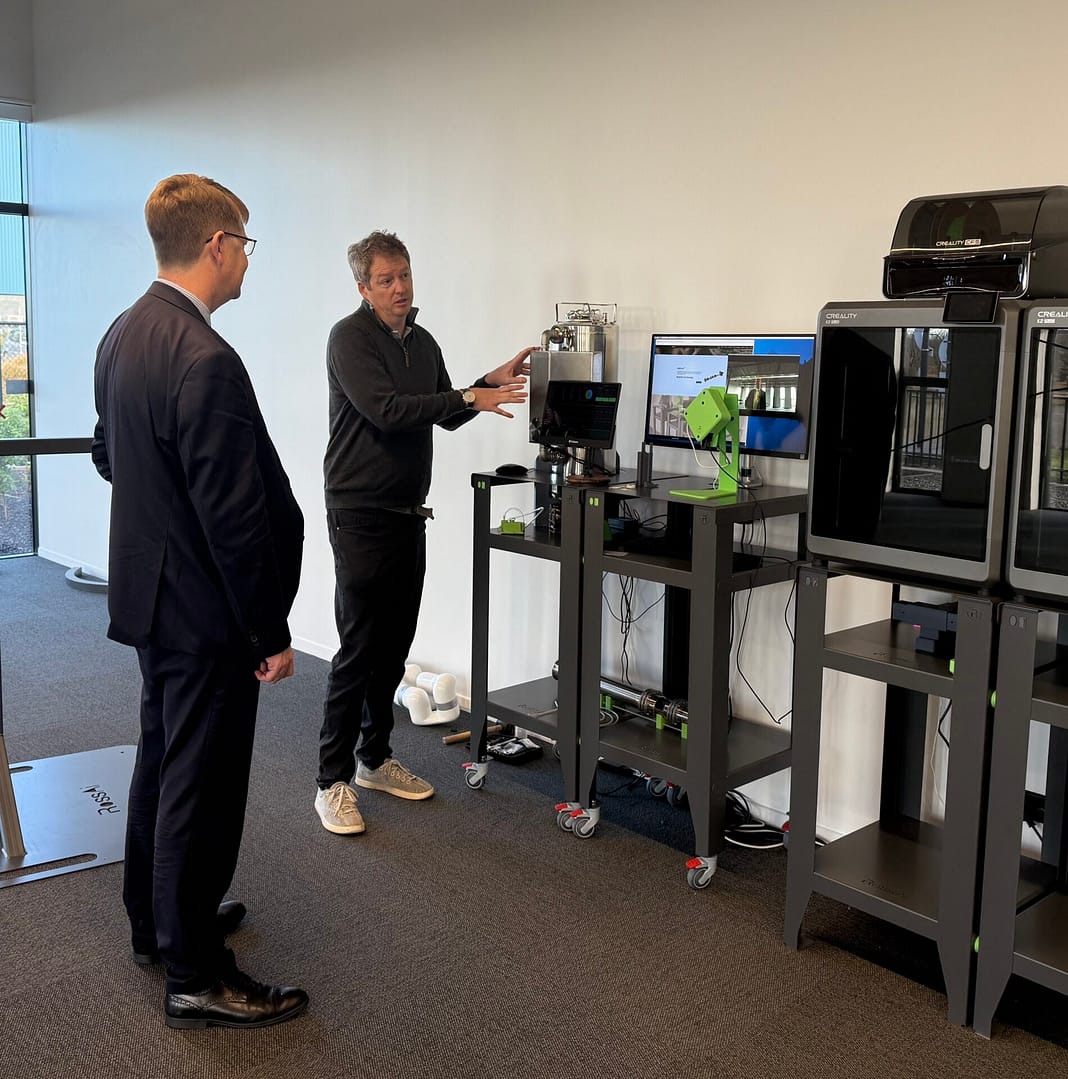Horizon Europe, the EU’s largest-ever science and innovation programme, could open new doors for Hawke’s Bay’s food and agritech innovators, providing a platform to connect with global partners and take big ideas to the world, says Foodeast Haumako chair Dr Nicky Solomon.
His Excellency Lawrence Meredith, visited the region for two days this month. His trip included a visit to Foodeast Haumako, where he spent time with on-site innovators and shared information on the €95.5 billion global collaboration programme New Zealand formally joined in 2023.
It might seem like a huge leap for smaller companies, but plenty of Hawke’s Bay examples of global success already exist; think Rockit’s apples in a tube born in Havelock North, Plant & Food’s breeding programmes at the Te Aute research orchard, the agri-automation smarts of companies like Croptide (based at Foodeast Haumako), and the biotech breakthroughs coming out of Mara Bio, also based at Foodeast Haumako.
Hawke’s Bay on the Horizon
Across New Zealand, researchers and innovators are already walking the Horizon Europe path — from the University of Auckland’s work on digital twins for personalised healthcare, to Lincoln Agritech’s leadership in plant biosecurity through the STELLA project, Scion’s biodegradable sportswear collaboration, and the University of Otago’s contributions to global food system resilience. Each of these projects is supported by Horizon Europe partnerships that are helping put New Zealand science on the world stage.
Although based in Wellington, the ambassador is a strong proponent of regional engagement, and this was not his first visit to Hawke’s Bay. On a previous trip, he toured Rockit Global’s operations and met other business contacts.
This most recent trip, facilitated by Hawke’s Bay–based international trade policy specialist Stephen Jacobi, included visiting Foodeast Haumako. During the visit he also addressed the Hawke’s Bay branch of the NZ Institute of International Affairs and attended an event with Finance Minister Nicola Willis organised by the Hawke’s Bay Chamber of Commerce, and met with local leaders including Tukituki MP Catherine Wedd.
At Foodeast Haumako, the ambassador emphasised the growing opportunity for New Zealand innovators to engage in global research and commercial partnerships.
Europe is actively looking for partners, and New Zealand has a lot of what Europe wants. From agri-science to geothermal energy, rockets to biodegradable sportswear, we see a lot of innovation here with global relevance. His Excellency Lawrence Meredith

Horizon Europe is the European Union’s flagship investment in research and innovation. The programme has six clusters, including ‘Food, Bioeconomy, Natural Resources, Agriculture and Environment’, which focuses on sustainable agriculture and forestry, healthy and safe food systems, biodiversity and ecosystems, circular bioeconomy, and water, oceans and soils.
Horizon Europe: more than just funding
The ambassador noted that while Horizon Europe provides significant funding, the most enduring benefits are strategic. “The deeper value is in the global collaboration; building capability, accessing networks, sharing data and solving problems together,” he said. “Funding follows those relationships.”
Participation in Horizon Europe comes with technical and administrative requirements. Projects must include at least three international partners, one of which must be a European institution. Ambassador Meredith strongly recommended that potential New Zealand applicants involve a university early in the process to support the academic-level reporting and compliance needed under the programme. “These hurdles are real. But they are there to ensure quality, transparency and real-world outcomes,” he said.
Fermentation and food tech
Fermentation featured prominently in discussions during the visit. Europe is investing heavily in microbial fermentation, precision fermentation and biomass recovery as part of its climate and food systems strategies, technologies that sit at the core of Foodeast Haumako’s strategic direction.
For New Zealand, fermentation offers a pathway to address food security, land-use pressure and export market resilience in a climate-stressed world. “These are systems-level solutions,” said Dr Solomon. “And they are not just good science. They are commercially viable, internationally attractive and exactly the kind of innovation our export markets want from us.”
During the visit, the ambassador met with two of Foodeast Haumako’s anchor tenants: RossAi and Mara Bio, both demonstrating the region’s capacity for globally relevant innovation.
Mara Bio is a biotechnology company using edible fungi and microbial fermentation to transform food processing by-products, such as fruit and dairy industry side streams (into high-value, nutrient-rich functional proteins. Their platform, based at Foodeast Haumako, is helping tackle both food system circularity and nutritional challenges.
On the technology front, RossAi is, among other products, developing artificial intelligence technology to enable real-time, on-site testing in food production and processing, eliminating the delays and inefficiencies of traditional lab-based sampling that requires off-site analysis. During the visit, the ambassador was introduced to LabLess, an AI-powered system that delivers faster, more accurate data directly within agri-tech and processing environments, which work together to enhance efficiency, precision, and sustainability across the sector.
“These are companies with global potential. Exactly the kind of innovation we want to see more of,” said the ambassador.
Foodeast Haumako continues to strengthen its role as a key enabler of food, beverage and agritech innovation. The organisation’s team is small, focused and deeply committed to delivering value across the region and beyond.
Dr Solomon says New Zealand faces significant challenges, including climate volatility, land-use constraints and distance from international markets. These challenges make innovation not just desirable but essential. Fermentation and circular bioeconomy technologies are emerging as two of the most promising responses, both for domestic resilience and global competitiveness.
“This is just the beginning,” said Dr Solomon. “With the right support, Hawke’s Bay’s brightest ideas can take root globally and help shape the future of food.”